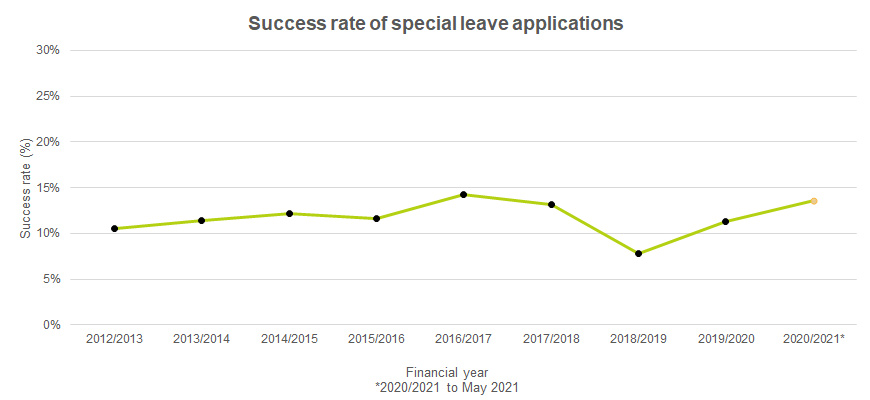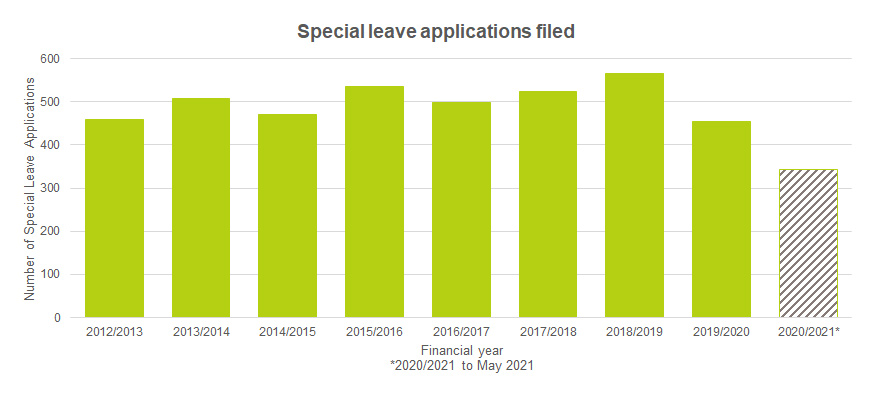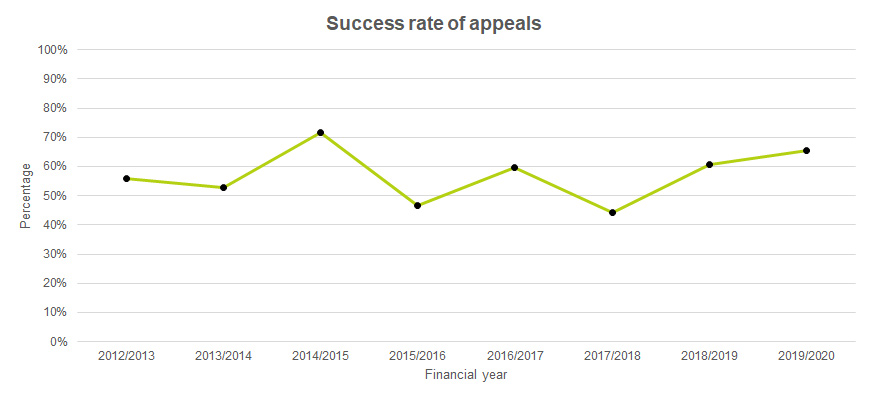
Appeals to the High Court: The statistics, a guide to the process and some practical tips

"So… what are our chances of winning in the High Court?" It's a question we often get asked by clients seeking one more roll of the dice. Understanding your prospects and calculating your return on the investment of another appeal starts with an understanding of how few cases are granted special leave to appeal.
Our analysis below reveals that the bar remains high for convincing the High Court to hear your case.
Special leave: "What's the chance the High Court will hear the case?"
This first hurdle is a significant one and the short answer is "very low". Since 2012, the Court has decided to hear between approximately 7.8% and 14.3% of cases filed, with an average of about 11.8% per year.

There is no automatic right to appeal to the High Court. The Court receives over 400 applications a year and so cannot hear them all. The first step is seeking "special leave" where the Court (usually 2 or 3 judges) decides whether they will hear the case. The test in section 35A of the Judiciary Act 1903 (Cth) involves three questions:
- whether the case presents a question of law that is of public importance (because of its general application or otherwise);
- whether the Court needs to resolve a difference of opinion between different courts, or within a single court, as to the state of the law; or
- whether the interests of the administration of justice require the Court to hear the case.
First, the parties prepare very short written submissions for the Court. Second, the Court reviews the submissions and materials from the Courts below. There is very little scope for putting anything other than certain prescribed materials before the Judges. Third, the Court tells you that it will (a) list the application for oral hearing; or (b) decide the application without a hearing, "on the papers".
"On the papers" is almost always bad news for the matter continuing. Only about 1.7% of cases have been granted special leave without a hearing in the 2020-2021 financial year up to May 2021.
In contrast, an oral hearing is cause for careful optimism. About 37.5% of cases listed for an oral hearing were granted special leave in the 2020-2021 financial year up to May 2021.
There is no automatic right to appeal to the High Court. The Court receives over 400 applications a year and so cannot hear them all. The first step is seeking "special leave" where the Court (usually 2 or 3 judges) decides whether they will hear the case. The test in section 35A of the Judiciary Act 1903 (Cth) involves three questions:
- whether the case presents a question of law that is of public importance (because of its general application or otherwise);
- whether the Court needs to resolve a difference of opinion between different courts, or within a single court, as to the state of the law; or
- whether the interests of the administration of justice require the Court to hear the case.
First, the parties prepare very short written submissions for the Court. Second, the Court reviews the submissions and materials from the Courts below. There is very little scope for putting anything other than certain prescribed materials before the Judges. Third, the Court tells you that it will (a) list the application for oral hearing; or (b) decide the application without a hearing, "on the papers".
"On the papers" is almost always bad news for the matter continuing. Only about 1.7% of cases have been granted special leave without a hearing in the 2020-2021 financial year up to May 2021.
In contrast, an oral hearing is cause for careful optimism. About 37.5% of cases listed for an oral hearing were granted special leave in the 2020-2021 financial year up to May 2021.

"Will they be interested in our type of case?"
The Court hears cases of all types. It is not reliable to assume that the Court will be more or less attracted to a case solely because of the area of law.
Clients are often interested in how many criminal and migration cases that the Court hears. Our analysis below (in the 2020/2021 financial year up to May 2021) shows that those are a significant number, but not a majority, of the cases. The balance covers almost every area of law:

Similarly, the amount of money in dispute is rarely a good guide for the grant of special leave.
The second hurdle: winning the appeal
If your case has been granted special leave, your odds improve. From July 2012-July 2020, approximately 57% of applicants went on to win the appeal:

Practical tips when considering appeals to the High Court:
- Be realistic: There are no sure bets for special leave. Even a large, high-profile, contentious case is not assured of gaining special leave. When assessing your return on investment, realise that prospects of special leave are low in every case.
- Know all the costs: The High Court is an expensive forum. The Court fee alone for filing a special leave application can be over $15,000. Get a comprehensive estimate from your lawyers for going "all the way" – ie. special leave and the appeal including Court fees, solicitor and barrister fees, and inter-State travel expenses.
- Use specialist lawyers: The High Court has strict technical requirements that you need to get right. Failing to meet these can be embarrassing and, at worst, trigger deemed abandonment of your application. Use lawyers that you are confident have the requisite experience with High Court appeals. The Clayton Utz commercial litigation team has recently run and defended a number of special leave applications, including in tandem with existing legal teams.
- Consider specialist barristers: Where the fate of your appeal can depend on 10 pages of submissions and 20 minutes in Court, every word matters. Our clients will often use specialist High Court barristers that know how to get across a case quickly and draw out the special leave points most likely to take the Court's interest. There are relatively few barristers who appear regularly in the High Court.
- Not too late to negotiate: Matters settle at all stages of litigation and appeals. You should consider without prejudice negotiations as a cheaper alternative to appealing. Winning your special leave application may be a great level to encourage a resolution. However, the golden rule is always to look ready and be ready to press the appeal if the negotiations fail.
